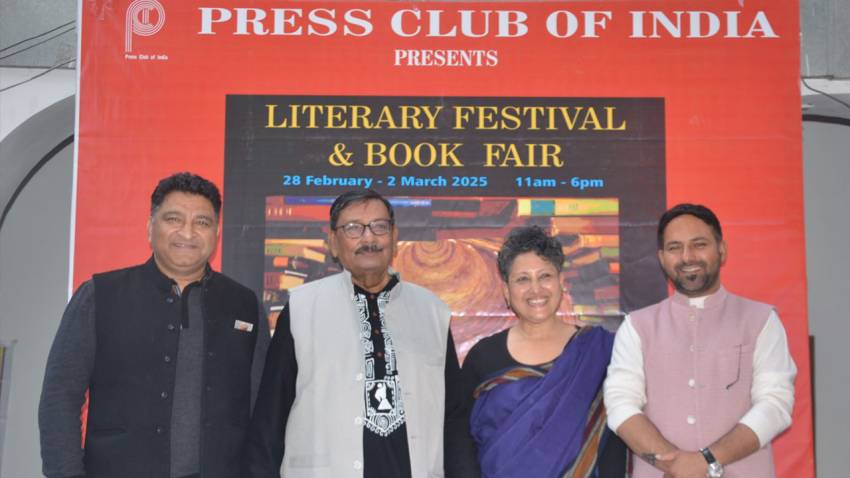Press Club of India’s Lit festival & Book Fair day 2 kicks off with key panel discussion on protecting Press Freedom

New Delhi : The second day of the Press Club of India’s Literary Festival focused on an issue that has become more urgent than ever—press freedom and the challenges journalists face. The discussions were direct, informative, and at times, concerning, as speakers shared real-life experiences and proposed solutions to protect journalism in India.
A key session, How Media Bodies Can Protect Press Freedom, featured Abhinandan Sekri (DIGIPUB), Sujata Madhok (DUJ), Anant Nath (EGI), Binny Yadav (IWPC), and Neeraj Kumar (PCI), moderated by journalist Vinay Kumar. They debated the role of media organizations in defending press freedom beyond just issuing statements.
Anant Nath, President of the Editors Guild of India, defended the importance of public statements, arguing they serve as essential signals of resistance. He cited the Editors Guild’s role in comedian Kunal Kamra’s legal battle against the IT Rules, 2023, which led to a favorable ruling from the Bombay High Court.
Abhinandan Sekri called for a professionally managed secretariat to protect journalists’ rights, pointing out that reporters, already occupied with their work, cannot take on advocacy efforts alone. DIGIPUB, he revealed, is working to build such a support system for independent journalists and digital news platforms.
Sujata Madhok highlighted the financial instability plaguing journalists, using the sale of United News of India (UNI) to The Statesman for ₹44 crore as an example. She questioned whether this amount would be enough to clear pending salaries and provident fund dues, emphasizing that economic insecurity is a major threat to press freedom.
Neeraj Kumar, Secretary General of the Press Club of India, warned that journalists are increasingly abandoned by their own organizations when they challenge powerful figures. He shared an incident where a reporter was disowned after questioning a minister, underscoring the urgent need for a press body that offers legal, financial, and professional assistance.
The discussion also touched on how government funding compromises media independence. While many media owners want to reduce reliance on state advertising, Anant Nath noted that its sheer scale makes it difficult. He stressed that only collective action from media bodies can push back against financial pressures that threaten editorial freedom.
In the Author Spotlight segment, Rehan Abbas launched his book Tapish in a discussion with lyricist Alok Shrivastav and journalist Sudha Sadanand. Independent journalist Makepeace Sitlhou, a contributor to But I Am One of You, spoke with rights activist Suhas Chakma, stressing the need for better media coverage of the Northeast.
Later in the day, a session on Media and the Law featured legal experts Warisha Farasat, Sarim Naved, Pamela Philipose, and Vivek Mukherjee, moderated by journalist Mahtab Alam. The panelists discussed how existing laws are increasingly being used against journalists, particularly in sensitive regions like Kashmir.
Farasat highlighted how the Unlawful Activities (Prevention) Act (UAPA), originally meant for counterterrorism, is now being used to silence journalists. Philipose warned that digital media, once seen as a space for free speech, is now under increasing legal scrutiny. Sarim Naved pointed out the legal ambiguity surrounding independent digital reporters, who often lack formal recognition as journalists, making them more vulnerable.
As the session wrapped up, Philipose urged both journalists and the public to stay vigilant against laws that restrict press freedom. She warned that expanding legal and financial controls could soon choke independent journalism, with even ordinary citizens being empowered to accuse reporters of “anti-national” speech.
The second day of the festival sent a strong message—press freedom cannot be defended by journalists alone. Media organizations, legal experts, and civil society must unite to push back against rising restrictions or risk losing one of democracy’s most essential pillars.








